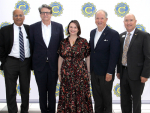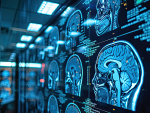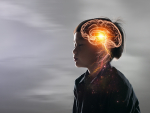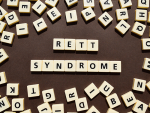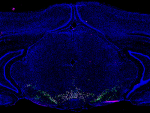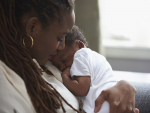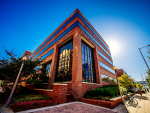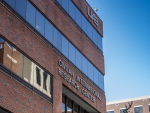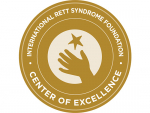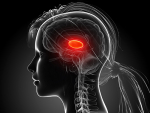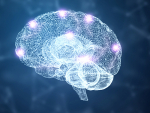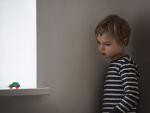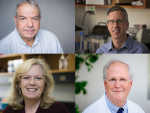Displaying items by tag: civitan international research center
The Civitan International Research Center’s mission is to improve the well-being and quality of life of individuals and families affected by intellectual and developmental disabilities.
Tagged under
For their continued research in sleep disorders in individuals with Down syndrome, UAB’s Caroline G. Richter, Ph.D. and S. Justin Thomas, Ph.D. were named the recipients of the 2024-2025 McNulty Civitan Scientist Award.
Tagged under
This finding suggests that therapy to remodel synapses could help memory in old age and dementia patients.
Tagged under
Tagged under
The new, five-year grant will support research in the UAB Alzheimer’s Disease Research Center to address dementia disparities in the Deep South.
Tagged under
The drug appears to help strengthen pathways in the brain, improving the ability of neurons to communicate with each other.
Tagged under
The distinct cell populations were identified by single-nucleus RNA sequencing of 21,600 cells of the rat ventral tegmental area, located in the midbrain.
Tagged under
NIH selects UAB and UA as research sites for a longitudinal study on child development since pregnancy.
Tagged under
Tagged under
- release
- advancement
- office of the president
- office of the provost for student and faculty success
- department of anesthesiology and perioperative medicine
- department of neurology
- department of biochemistry and molecular genetics
- department of cell developmental and integrative biology
- department of clinical and diagnostic sciences
- department of dermatology
- department of emergency medicine
- department of family and community medicine
- department of genetics
- department of medical education
- department of medicine
- department of microbiology
- department of neurobiology
- department of neurosurgery
- department of obstetrics and gynecology
- department of ophthalmology and visual sciences
- department of orthopaedic surgery
- department of otolaryngology
- department of pathology
- department of pediatrics
- department of pharmacology and toxicology
- department of physical medicine and rehabilitation
- department of psychiatry and behavioral neurobiology
- department of radiation oncology
- department of radiology
- department of surgery
- division of academic general pediatrics
- division of acute care surgery
- division of adolescent medicine
- division of advanced medical imaging
- division of anatomic pathology
- division of cardiothoracic surgery
- division of cardiothoracic anesthesia
- division of child abuse pediatrics
- division of clinical immunology and rheumatology
- division of community anesthesia
- division of diagnostic radiology
- division of developmental and behavioral pediatrics
- division of forensic pathology
- division of gastroenterology and hepatology
- division of gastrointestinal surgery
- division of general internal medicine
- division of general pediatrics and adolescent medicine
- division of genomics and bioinformatics
- division of gerontology geriatrics and palliative care
- division of gynecologic oncology
- division of hematology and oncology
- division of infectious diseases
- division of informatics
- division of laboratory medicine
- division of maternal fetal medicine
- division of molecular and translational biomedicine
- division of molecular imaging and therapeutics
- division of multispecialty anesthesia
- division of neonatology
- division of nephrology
- division of neuro oncology
- division of neuropathology
- division of pain medicine
- division of pediatric allergy and immunology
- division of pediatric hematology oncology
- division of pediatric cardiology
- division of pediatric critical care medicine
- division of pediatric dermatology
- division of pediatric emergency medicine
- division of pediatric endocrinology
- division of pediatric gastroenterology
- division of pediatric hospital medicine
- division of pediatric infectious diseases
- division of pediatric nephrology
- division of pediatric neurology
- division of pediatric oncology
- division of pediatric optometry
- division of pediatric pulmonary and sleep medicine
- division of pediatric rehabilitation medicine
- division of pediatric rheumatology
- division of pediatric surgery
- division of plastic surgery
- division of preventive medicine
- division of pulmonary allergy and critical care medicine
- division of reproductive endocrinology and infertility
- division of surgical oncology
- division of transplantation
- division of vascular surgery and endovascular therapy
- 1917 clinic
- acute care for elders unit
- addiction recovery program
- addiction recovery scholars
- alabama genomic health initiative
- all of us research program
- autism spectrum disorders clinic at uab
- center for addiction and pain prevention and intervention
- center for aids research
- center for clinical and translational science
- center for emerging drug discovery
- center for exercise medicine
- center for free radical biology
- center for interprofessional education and simulation
- center for genomic medicine
- center for low vision rehabilitation
- center for metabolic bone disease
- center for neurodegeneration and experimental therapeutics
- center for outcomes and effectiveness research and education
- center for palliative and supportive care
- center for pediatric onset demyelinating disease
- civitan international neuroimaging laboratory
- civitan international research center
- civitan sparks clinics
- comprehensive arthritis musculoskeletal and autoimmunity center
- comprehensive cardiovascular center
- comprehensive center for healthy aging
- comprehensive diabetes center
- comprehensive neuroscience center
- comprehensive stroke center
- comprehensive transplant institute
- deep south resource center for minority aging research
- gregory fleming james cystic fibrosis research center
- epilepsy center
- heflin center for genomic sciences
- hepatorenal fibrocystic diseases core center
- department of biomedical informatics and data science
- institute for cancer outcomes and survivorship
- legacy of hope
- liver center
- lung health center
- mcknight brain institute
- minority health and health equity research center
- mucosal hiv and immunobiology center
- multiple sclerosis center
- national spinal cord injury statistical center
- nephrology research and training center
- obesity health disparities research center
- obrien center for acute kidney injury research
- pancreatobiliary disease center
- parkinsons disease information and referral center
- pediatric pulmonary center
- precision medicine institute
- primary care research collaborative
- spain rehabilitation center
- school of medicine
Part of the mission of the Civitan International Research Center is to foster the next generation of scientists studying brain development.
The Center of Excellence designation provides funding and linked research opportunities for the member clinics.
Tagged under
Matt Alexander, who studies muscular dystrophy, is this year’s recipient of the Chesapeake Civitan McNulty Award.
This research offers fundamental insights about sensory thalamic subnetworks and will enable powerful new strategies to probe behavioral and perceptual functions of these distinct circuits.
Tagged under
Graduate student Rylie Hightower is the fifth UAB student to receive an F99/K00 grant from the National Institutes of Health.
Tagged under
This work is a step forward in understanding early molecular changes that influence the development of addiction, and may have application to the role of similar gene programs that mediate other types of behavior, memory formation or neuropsychiatric disorders.
Tagged under
A mouse model and previous studies suggest that genetic intervention in SHANK3-related ASD may be most effective earlier in development.
Tagged under
The guide is unique in having separate, and extensive, basic versus clinical neuroscience sections, which support each other.
Tagged under
The UAB Comprehensive Neuroscience Center welcomes new leadership in Adrienne Lahti and Lucas Pozzo-Miller.
Tagged under
Two UAB neuroscientists have been included in a listing of 100 of the most inspiring black scientists in the nation.
Tagged under
